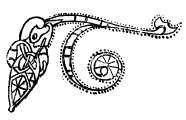
CHAPTER X.
Conclusion to The Brehon Laws
(Hibernice: The Conclusion Begins Down Here.)

HE Danes were the first wreckers of purely Gaelic institutions in Ireland. Though their power was broken at Clontarf, so also, in the death of Brian and his son, was destroyed the rising hope of an immediate and thoroughly national restoration of Celtic institutions and forms which had been interrupted. The interruption becoming permanent, the spell of attachment was broken, and some of those institutions and forms became definitely extinct. Instead of a speedy return of vigorous national life, there was a state of doubtful oscillation between relapse and convalescence. Recovery was not complete when the Anglo-Normans came and put an eternal period to its progress.
The Celtic system was indeed maintained over the greater part of the country; but only in its shattered and incomplete condition, and only with a view to the interests of isolated and rival communities or rival individuals; never universally or with a view to the interests of the nation as a whole, and never with the old unquestioned power and full reverential obedience. The Anglo-Irish, wherever they were sprinkled throughout the country, except the Pale, did in the main adopt Irish laws, language, dress, and customs; and such of them as attained sufficient power became Irish chiefs, and appointed their own brehons in the Irish way. But the nation considered as a political unit had lost the essential organism and attributes of a state, and the statesmanship of England was directed to the prevention of re-organisation and the fomenting of disorder. In obedience to this statesmanship a so-called parliament, consisting mainly of self-elected English officials, was held in Kilkenny in 1367, and an Act was passed, written not in Irish, nor even in English, but in Norman-French, branding the Irish as enemies, and penalising the adoption of their dress, manners, language, and laws. Various other measures conceived in a like spirit followed. They were not immediately successful in their direct object; but they were too successful in sowing discord among people who wanted only to be let alone, and they armed and created an opportunity for miscreant adventurers hungry for a morsel of prey. This latter was the main object of those measures. The trade of fomenting disorder throve apace. It was the only trade that did.
